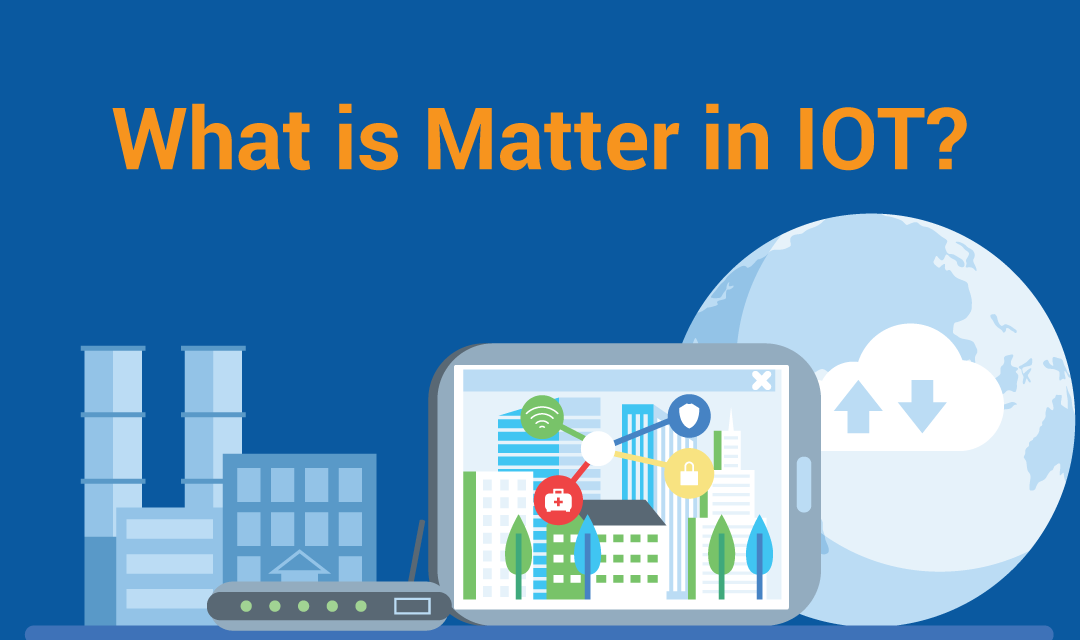
Matter is an open-source connectivity standard that aims to increase compatibility among smart home and IoT devices. Matter is a relatively new standard, which was first published in October 2022. It was formally known as Project CHIP (Connected Home over IP). Matter is developed by the Connectivity Standards Alliance (CSA), formerly known as the Zigbee Alliance. It is designed to ensure that various IoT devices from different manufacturers can communicate with each other seamlessly.
Some of the key points about Matter standard in IoT include:
- Interoperability: One of the primary goals of Matter is to improve interoperability between different IoT devices and ecosystems. It intends to create a unified standard that allows devices from various manufacturers to communicate and work together without glitches. Matter is a new smart home standard that allows smart home devices to be controlled by one app, and improves security.
- Connectivity: Matter is built on top of Internet Protocol (IP), which is widely used for Internet communication. This choice of protocol makes it easier for devices to communicate across different networks including IP and Thread, and ensures that Matter devices can be integrated into existing networks. Matter allows the devices to work offline without requiring continuous access to the cloud and the Internet.
- Thread Support: Thread is a mesh-based wireless protocol that creates a low-latency offline environment that instantly sends and receives data across devices. Thread protocol allows Matter-certified devices to continue working together even if you lose the internet. Non-Matter compliant smart home devices made in the past were useless during disruption to the Internet, so supporting Thread protocol solves major pain points with Matter.
- Security: Security is a top priority for Matter. It includes robust security features, such as encryption, authentication, and device provisioning, to protect against unauthorized access and data breaches.
- Cross-Platform Compatibility: Matter is designed to work across different operating systems and platforms, making it easier for developers to create applications and services that can interact with a wide range of IoT devices.
- Scalability: Matter is suitable for a wide range of IoT applications, from simple sensors and actuators to more complex devices like smart speakers, thermostats, and security cameras. It can scale to accommodate different use cases.
- Open Source: Matter is an open-source project, which means that the specifications, reference implementations, and development tools are openly available. This openness promotes collaboration and innovation among developers and manufacturers without loyalty.
- Industry Support: Several major tech companies, including Apple, Google, Amazon, and the Connectivity Standards Alliance (CSA), have supported and contributed to the development of Matter. This support increases the likelihood of widespread adoption. Devices such as Alexa Echo, Google Home & Nest, Samsung Smarthings, and Apple iPhone & iPad are a few examples of IoT supporting Matter standards.
- Energy Efficiency: Matter aims to be energy-efficient, making it suitable for battery-powered IoT devices like smart sensors and wearable devices.
IoT devices made in the past were supported by Zigbee, Z-Wave, Bluetooth, and Wi-Fi standards, and they don't necessarily work together as a smart home unit. A homeowner must install proprietary hubs and bridges from Philips Hue and Lutron Caseta to use non-Matter standard devices.
To use Matter-compliant devices, you need a Matter controller and a companion smart home app like Alexa, Siri, and Google Assistant. However, Matter controllers are not brand-specific and are now built into many smart speakers and hubs of the major smart home platforms. This includes the iOS, Android, Apple HomePod, Apple TV, Amazon Echo, Google Nest Hub and Samsung SmartThings hubs.
 FAQs
FAQs
Not all existing devices will be compliant with Matter, but some Wi-Fi devices can get a firmware update to make them Matter-compliant.
Yes, the devices that cannot be upgraded to Matter will continue to work with the platforms they already work in. They can co-exist with Matter devices and will not conflict with each other.
Conclusion
Matter is a new, open-source standard that uses a wireless technology based on IP to connect to each device. Matter also supports Thread protocol to make the devices work offline during Internet outages. Matter will also use Bluetooth during the initial setup process to pair devices with controlling apps like Android or iOS. Devices must comply with the Matter standard to ensure they are compatible with smart home and voice services such as Amazon’s Alexa, Apple’s Siri, and Google’s Assistant.
The goal of Matter is to simplify the development and deployment of IoT devices while ensuring a high level of compatibility and security. As it continues to evolve and gain industry support, it has the potential to become a significant standard in the IoT space, facilitating the growth of smart homes and interconnected devices.
Share this post
Leave a comment
All comments are moderated. Spammy and bot submitted comments are deleted. Please submit the comments that are helpful to others, and we'll approve your comments. A comment that includes outbound link will only be approved if the content is relevant to the topic, and has some value to our readers.




Comments (0)
No comment